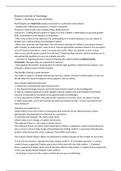Research methods in Psychology:
Chapter 1: Psychology is a way of thinking
Psychologists are empiricists: basing conclusions on systematic observations.
- Students psy Research producers, research consumers:
Producers: hope to get a job studying things, doing research.
Consumers: reading about research to apply it to work, hobbies, relationships or personal growth.
Both: commitment to the practice of empiricism.
- Why is the producer role important? By participating as a research producer, you can expect to
deepen your understanding of psychological inquiry.
- Why is the consumer role important? You will need to develop the ability to read about research
with curiosity, to understand it, learn from it, and ask appropriate questions about it. You encounter
a lot of research everywhere, some is accurate and useful, others are dubious or even wrong.
How can you tell the good research from the bad? Understanding research methods enables you to
ask appropriate questions so you can evaluate correctly.
-- Licensure in helping professions requires knowing the research behind evidence-based
treatments: therapies that are supported by research.
- Interrogating information: knowing how to task the right questions, determine the answers, and
evaluate a study on basis of those answers.
The benefits of being a good consumer
Your skills in research methods will help you become a better consumer of information, so you can
decide when the research supports some programs, but not others.
How scientists approach their work
1. Empiricism: systematically observing the world
2. Test theories through research and revise their theories based on the resulting data
3. Take an empirical approach to both applied research (targets real-world problems) and basic
research (is intended to contribute to the general body of knowledge)
4. Once discovered an effect, they plan further research to test why, when, for whom it works.
5. Make work public, so it’ll be reviewed and they can respond to that + so they can improve the
story media tell
Scientists are empiricists (1)
Using evidence from the senses or instruments that assist the senses (thermometres, timers,
photographs, questionnaires) as the basis for conclusions.
Scientists test theories: The Theory-Data Cycle:
Collect data to test, change, or update the theories.
The cupboard theory vs. the contact comfort theory:
The cupboard theory of mother-infant attachment: mother is valuable to a baby mammal because
she is a source of food. Baby hungryfoodpleasant feeling. Mother is associated with pleasure,
positive value because she is the ‘cupboard’ from which food comes.
The contact comfort theory: babies are attached to mothers because of the comfort of cozy touch.
To test the two theories: separate food and contact comfort. 3 possible outcomes: 1. contact
comfort theory supported if babies spent most of the time with the cloth mother. 2. Cupboard
theory supported if babies spent most of the time with the milk mother. 3. Neither theory supported
if time was equally divided between both mothers.
-- Evidence in favour of the contact comfort theory was overwhelming
, so in fact: Harlow used the two theories to make two specific predictions about the outcome, then
he used the data he recorded to support only one of the theories. = theory-data cycle
Theory, hypothesis, and data
Theory= set of statements that describes general principles about how variables relate to one
another.
Hypothesis= prediction. Specific outcome the researcher expects to observe in a study if the theory is
accurate.
Data= set of observations, data may either support or challenge the theory. If it matches, the
researcher’s confidence in the theory is strengthened. Otherwise the theory might need to be
improves or revised. (figure 1.5 page 13!)
Features of good scientific theories
Good theories are supported by data: a theory that’s supported by a large quantity and variety of
evidence is a good theory
Good theories are falsifiable: falsifiability: a theory must lead to hypotheses that, when tested, could
actually fail to support the theory.
Good theories have parsimony: parsimony: theories are supposed to be simple. If two theories
explain the data equally well, most scientists will opt for the simpler, more parsimonious theory.
(when it makes is less parsimonious, but does a better job of accommodating data; that’s more
important)
Theories don’t prove anything
Prove as a word is not used in science, only support or are consistent with a theory is used. Or
inconsistent / complicate a theory. It can always be so that there comes new information that
changes or improves current ideas. – Scientists evaluate their theories based on the weight of the
evidence, for and against.
Scientists tackle applied and basic problems
Applied research: practical problem in mind, real-world context. (new learning method working than
a former one in a certain school)
Basic research: no specific, practical problem: enhance the general body of knowledge. (may be
applied to real-world research later on, but for now is quite practical. ‘capacity of human memory’)
Translational research: use of lessons from basic research to develop and test applications to health
care, psychotherapy, other forms of treatment and interresearch. (basic research on how
mindfulness changes people’s patterns of attention translated into study skills intervention)
Scientists dig deeper: almost each study new questions.
Scientists make it public: the publication process: writing a paper and submit it to a scientific journal.
articles are peer-reviewed which means the editor sends it to experts who say something about
the flaws and virtues of the work. After that the editor decides whether it will be published or not.
This process is rigorous (strict) – anonymous, comment on a list of things
Scientists talk to the world: from journal to journalism
journals: read by scientists/psy students, not general public
journalism: what most of us hear on tv, read in magazines / newspapers / internet
Benefits and risks of journalism coverage
by reading about psychological research the general public can learn what psychologists really do (+)
They might change habits or set different goals (+)





